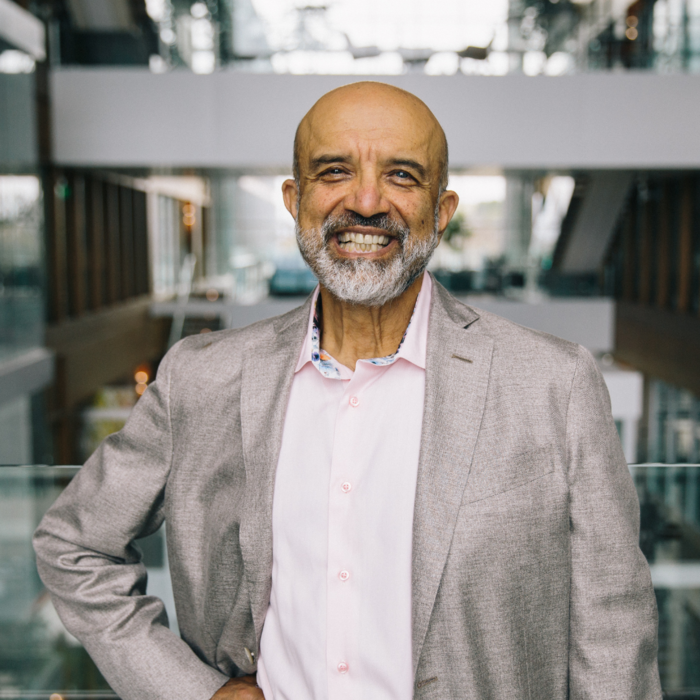NEW YORK, February 22, 2022—The Vilcek Foundation recognizes and celebrates the research contributions of molecular biologist Vishva M. Dixit in a new article and video profile shared on the foundation’s website.

Credit: Photo courtesy of the Vilcek Foundation
NEW YORK, February 22, 2022—The Vilcek Foundation recognizes and celebrates the research contributions of molecular biologist Vishva M. Dixit in a new article and video profile shared on the foundation’s website.
Dixit is the recipient of the 2022 Vilcek Prize in Biomedical Science. He receives the award for his groundbreaking discoveries on the mechanism of apoptosis—a biochemical process of programmed cell death—and for his work to understand and uncover inflammatory pathways in disease.
The mission of the Vilcek Foundation is to recognize and celebrate the contributions of immigrants to biomedical science and to the arts and humanities in the United States. Since 2006, the Vilcek Foundation Prizes have been awarded annually in recognition of outstanding immigrant scientists in the United States. Prize recipients receive a commemorative trophy and a $100,000 cash award.
The Vilcek Foundation’s profile and video, Vishva M. Dixit: A Scientist who Swings for the Fences, center on the ambitious and analytical way the scientist has sought out projects that ignite his curiosity and have the potential to lead to discoveries that could have a profound impact on medicine.
Dixit was born in Kenya to parents who emigrated from India during World War II; he grew up in the town of Kericho and attended medical school at the University of Nairobi. In 1980 he immigrated to the United States to complete his residency at Washington University in St. Louis. Following his residency, Dixit began research at the University of Michigan. He began looking at areas of science that had great potential, seeking to delve into research where he could have a lasting impact.
At that time, he recalled, “Everybody was very interested in how cells divide and proliferate. And there was very little attention to the other side of that question, which is ‘How do cells die?’” Looking at the new technologies that became available to biomedical researchers during the 1980s—recombinant DNA technology, genetic screens, and monoclonal antibodies—Dixit saw an opportunity to make real progress in the study of cell death.
Dixit began investigations on the actions of tumor necrosis factor (TNF) on endothelium, looking particularly at TNF receptors and cell death. He discovered that caspase, a protease enzyme, was a key component of the molecular mechanism that led to apoptosis, or programmed cell death. His discovery marked a major breakthrough in the field. Programmed cell death is an important part of the life process for multicellular organisms, allowing the death of particular cells to build the tissues of the body, and to clear cells from the body so they do not become cancerous.
At Genentech, Dixit’s laboratory studies the pathways that drive inflammation in the body. His work has led to the development of therapies for inflammation-driven diseases including autoimmune disorders, rheumatoid arthritis, inflammatory bowel disease, and inflammatory atherosclerosis.
Describing his research ambitions, Dixit says, “I want to swing for the fences…. When you swing for the fences you miss a heck of a lot, but when you do hit one, you hit it out of the park.”
Read more about Vishva M. Dixit and his work at the Vilcek Foundation: Vishva M. Dixit: A Scientist who Swings for the Fences
The Vilcek Foundation
The Vilcek Foundation raises awareness of immigrant contributions in the United States and fosters appreciation of the arts and sciences. The foundation was established in 2000 by Jan and Marica Vilcek, immigrants from the former Czechoslovakia. The mission of the foundation—to honor immigrant contributions to the United States, and more broadly to foster appreciation of the arts and sciences—was inspired by the couple’s respective careers in biomedical science and art history. Since 2000, the foundation has awarded over $6.4 million in prizes to foreign-born individuals and supported organizations with over $5.6 million in grants.
The Vilcek Foundation is a private operating foundation, a federally tax-exempt nonprofit organization under IRS Section 501(c)(3).




